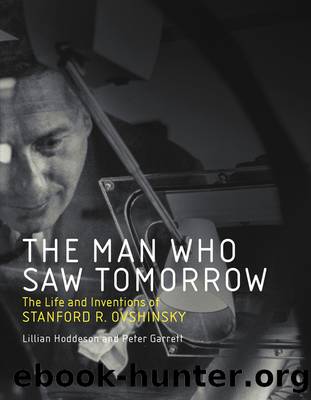The Man Who Saw Tomorrow by Hoddeson Lillian; Garrett Peter; & Peter Garrett

Author:Hoddeson, Lillian; Garrett, Peter; & Peter Garrett [Hoddeson, Lillian & Garrett, Peter]
Language: eng
Format: epub
Tags: Ovshinsky; amorphous and disordered; materials science; energy conversion; independent inventor; climate change; alternative energy; Energy Conversion Devices (ECD); information age; Ovitron switch; automation; Ovshinsky effect; rewritable CDs and DVDs; Energy Conversion Devices; Ovonic Battery Company; chalcogenide alloys; art and science; Workmen’s Circle cemetery; technological systems;
ISBN: 9780262037532
Publisher: MIT Press
Published: 2018-05-25T00:00:00+00:00
7
The ECD Community: A Social Invention (1965â2007)
Just as energy and information were two sides of the ECD coin, so were scientific innovation and social progress. As ECD gained resources and expanded its research programs, its growth allowed Stan and Iris to build a community based on their shared ideals, drawing on the examples of the Ferrer School, the Mohegan Colony, the Workmenâs Circle, and political systems they admired. Building this community was itself an act of social invention. Ovshinsky had been working toward it since his early years in Akron and Arizona shops, where he had helped novice machinists and toolmakers develop their skills and had organized reading groups. ECD was designed to be egalitarian and supportive; people were rewarded for merit and given opportunities to develop their fullest potential. âThis was how we believed society ought to be,â he said. And just as he claimed âproof of principleâ for pilot versions of his technological innovations, he would claim, âI proved a social thing,â and would speak with pride about his success in changing and helping to mold the lives of ECD staff members.
In building the ECD staff, Ovshinsky wanted to âgive jobs to people who had potential and didnât know itâ and to create an environment where everyone could âlive up to their potential, with ample opportunities, education, and culture.â This aspect of the company initially surprised some on the staff, but it became widely appreciated, as in the course of their work at ECD members came to recognize talents and potentials they didnât realize they had. Mike Fetcenko, for example, joined the company as a vacuum technician, was able to attend college at night through ECDâs tuition reimbursement program, and eventually rose to become senior vice president of the battery division (see chapter 9). He later observed, âStan was more proud of the ECD culture than virtually anything else I can think of.â1
Many were attracted by the shared goals and held by the close relationships. ECD felt like family, with Stan and Iris playing the roles of the benevolent father and loving mother. Fetcenko recalled, âI know of instances where an ECD colleague was going through some kind of personal hardship and Stan and Iris made a point of supporting them when they needed it most.â âThey would treat people very well,â agreed Joe Doehler, a physicist who came to ECD from Bell Labs. In turn Ovshinsky demanded, and got, long hours of willingly committed work.2 In bad financial times, many staff members worked even harder to help the company pull through. âIt was,â Ovshinsky said, âa participatory democracy based on merit and fairness and justice.â Or, as the scientist Srini Venkatesan noted in less exalted terms, ECD was âjust like a family. You know, if you make a mistake, they will take you to task.â
Besides offering a supportive, collegial sense of community, ECD also offered some protection from the injustices of a world that didnât share its egalitarian values. For black staff members facing a segregated housing
Download
This site does not store any files on its server. We only index and link to content provided by other sites. Please contact the content providers to delete copyright contents if any and email us, we'll remove relevant links or contents immediately.
Spare by Prince Harry The Duke of Sussex(4880)
Machine Learning at Scale with H2O by Gregory Keys | David Whiting(3790)
Harry Potter and the Goblet Of Fire by J.K. Rowling(3658)
Never by Ken Follett(3613)
I Have Something to Say by John Bowe(3439)
Unfinished: A Memoir by Priyanka Chopra Jonas(3244)
Fairy Tale by Stephen King(3051)
Greenlights by Matthew McConaughey(2996)
The Man Who Died Twice by Richard Osman(2876)
Will by Will Smith(2652)
Think Again by Adam Grant(2364)
Rationality by Steven Pinker(2189)
The Dark Hours by Michael Connelly(2136)
The Storyteller by Dave Grohl(2105)
It Starts With Us (It Ends with Us #2) by Colleen Hoover(2103)
The Dawn of Everything: A New History of Humanity by David Graeber & David Wengrow(2054)
Friends, Lovers, and the Big Terrible Thing by Matthew Perry(2044)
Can't Hurt Me: Master Your Mind and Defy the Odds - Clean Edition by David Goggins(2034)
The Stranger in the Lifeboat by Mitch Albom(1975)
